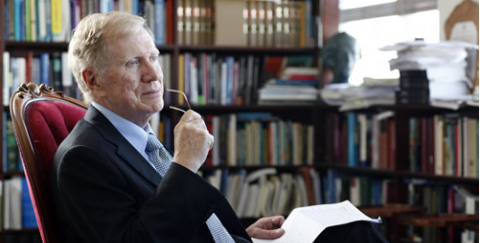
In 2010 Bishop Desmond Tutu, Nobel Peace Prize Laureate and Archbishop Emeritus of Cape Town, South Africa declared that the time had come, particularly for Africans, to stop the “wave of hate” and to stand up “against wrong”. He was referring to the wrong to “gay, lesbian, bisexual and transgendered people” who are “part of the African family” and who “are living in fear.”
This news from Africa would be bad enough. But the same fear extends far beyond that continent. And in the struggle against HIV/AIDS, which has afflicted humanity since the 1980s, the vulnerable are not only gays but also sex workers, injecting drug users (IDUs) and women. This fear exists in many countries where, despite the knowledge that science now affords us about human sexuality, irrational hatred of sexual minorities and sexual activities is encouraged and even sometimes promoted by religious leaders, in supposed reliance upon their understandings of religious texts. They rely on their imperfect understanding of what was written in ancient books long before Dr. Alfred Kinsey, American biologist and founder of the Institute of Sex Research, demonstrated the realities of human sexual experience, the frequency and variety of its manifestations, and the dangers and injustice of punishing people for adult, private, consensual sexual conduct.
Most religious people are good and kind. Love for one another exists as a basic tenet in all religions and all cultures. I have myself been brought up in religious faith. I honour brothers and sisters in all religions who are struggling to make a charitable, informed and unbiased contribution to the global struggle against HIV/AIDS.
Love for one another exists as a basic tenet in all religions and all cultures.
However, officially the Roman Catholic and Greek and Orthodox Christian churches are still in serious denial about the scientific evidence available about human sexuality. As they have often been in denial about science and its teachings in the past. Just as they originally denied the opinions of Galileo and Copernicus that the earth circled the sun. And as they, and the Anglican Church, originally denied Darwin’s thesis of evolution of the species, expounded 150 years ago.
Clutching onto imperfect understandings of ancient scripture, leaders of most of the spiritual faiths, instead of re-examining their holy texts by reference to science (as they did in other instances in the past), have adopted a new, irrational approach.
In other parts of the world, the hate may not always be so intense. But the stigma over sexual conduct that is often taught by religious people cannot be accepted any longer. It is now a major cause of death in the AIDS epidemic. It has to stop. Not only because it is immoral, conflicted, irrational and wrong. But also because it is now seriously impeding the global struggle against HIV and AIDS for the saving of lives. The magnitude of the suffering demands blunt speaking at this time. As Bishop Tutu has said:
“All of us, especially Africans, need access to essential HIV services…Show me where Christ said ‘Love thy fellow man, except for the gay ones’. Gay people too are made in my God’s image. I would never worship a homophobic God.”
Rightly, Bishop Tutu has drawn a parallel between the earlier, successful, global struggle against racial apartheid and the present global struggle against sexual apartheid. To the moral struggle against sexual apartheid must now be added the urgent needs of the struggle against HIV and AIDS.
To the moral struggle against sexual apartheid must now be added the urgent needs of the struggle against HIV and AIDS.
So we do have a problem. At its core, it arises from that fact that, 30 years into this epidemic, we do not have a cure or a vaccine for HIV or AIDS. We have palliative treatment of great utility. But the world cannot afford the continued economic burden of providing such treatment to 2.7 million new HIV infections each year. Urgent strategies of the world today must be addressed to the prevention of further infections.
Prevention cannot work so long as our societies stigmatise and hate many of the people most at risk of infection. Only by getting into their heads and helping them to practise and promote safer sexual and other conduct, can we bring the AIDS epidemic down. We cannot do this effectively without co-operation and support from religious leaders. Yet all too often they are silent or actually speak against the policies that may help to reduce the stigma, promote the necessary realism and spread the love of God, not the hate of vulnerable minorities.
Too many oppose early factual education of young people in the requirements of safer sex that may help save their lives.
Too many preach that condoms must not be distributed because they promote “extra-marital sex”, and falsely claim that condoms are ineffective to prevent the spread of the virus. In particular, too many oppose the provision of condoms and other protective facilities in prisons and other institutions that are potential incubators of the epidemic.
Too many object to the decriminalisation of sex work despite the value for life and human dignity that needs to be mobilised so as to empower those who work within it. Too many oppose syringe exchange facilities that help reduce the spread of infection by injecting drug users.
Too many fight fiercely against the removal of legal discrimination against gays and promote attacks on and hatred of gays in many societies. Far too many resist the removal of the patriarchal attitudes towards women, defending the persistence of their second-class status on unconvincing religious grounds.
Those who criticise these attitudes are often castigated as God’s enemy. Well, I declare that we are God’s friends and the helpers of true spirituality and love. The religion in which I was raised had, at its core, love for God and for one another. Reconciliation. Universalism. Non-discrimination. This should be the message of religion, especially today.
The special problem in relation to the HIV/AIDS epidemic is that the principal vectors for the spread of the infection of HIV involve three means that are often the subject of religious antagonism. I refer to sex, drugs and women.
Many religions demand exclusive marital relationships for any form of human sexual conduct. That this is not what happens in most societies does not matter. Marriage remains the religious gold standard. Those who do not, or cannot, fit within that standard are cast out of the kingdom of the faithful. But that means a huge proportion of humanity. And it is this proportion that is at risk of fear and stigma, specifically damaging to the struggle against the spread of HIV.
A clarion wake-up call must now be given.
Likewise, religion typically opposes drug use, which is often rightly seen as diminishing the full capacity of human self-control that is part of our essential human nature. Still, if this is partdrug use is part of the reality of the world, we must face it realistically and deal with its consequences. We should not write off to an early death those who do not meet religions’ standards.
Women are particularly vulnerable to HIV because, in many societies, they are controlled by men. The stories of violence against women infected by their husbands are all too common. It is a sad tale of disempowerment and vulnerability.
There is a serious tension between the endeavours of international and national leaders to promote good public health strategies to confront HIV and AIDS and the repeated instruction of many religious leaders today, denouncing adultery, condemning men who have sex with men (MSM), rejecting IDUs and disempowering women. If the reasoned messages of the Secretary-General of the United Nations, the Director of UNDP, the Director or UNAIDS and the High Commissioner of Human Rights are not heeded, a clarion wake-up call must now be given. This is because, following the global financial crisis, the world will simply not keep handing out the funds to provide expensive anti-retroviral treatment for HIV to the millions of newly infected people who will need them every year. We must halt the expansion of the epidemic. We need to re-double our efforts to secure effective vaccines and curative drugs. But, in the meantime, we must all contribute to prevention. Millions of lives are at stake. Protecting them effectively is one of the greatest moral challenges that is before the human family today.
Religion all too often panders to prejudice. It seems everyone needs someone to look down on. Religion should be leading people to look up: to the path of love, not hate.
This is an abridged version of the address, Aids and Religion: The Wave of Hate Must Stop, given at the Ecumenical Advocacy Alliance Symposium on Aids and Religion in Den Dolder, The Netherlands on 22 March 2010. The Hon. Michael Kirby AC CMG is a Commissioner of the UNDP Global Commission on HIV and the Law. He served as a Justice of the High Court of Australia from 1996 to 2009. He has also served as Foundation Chairman of the Australian Law Reform Commission. You can read Part II of the article here.


